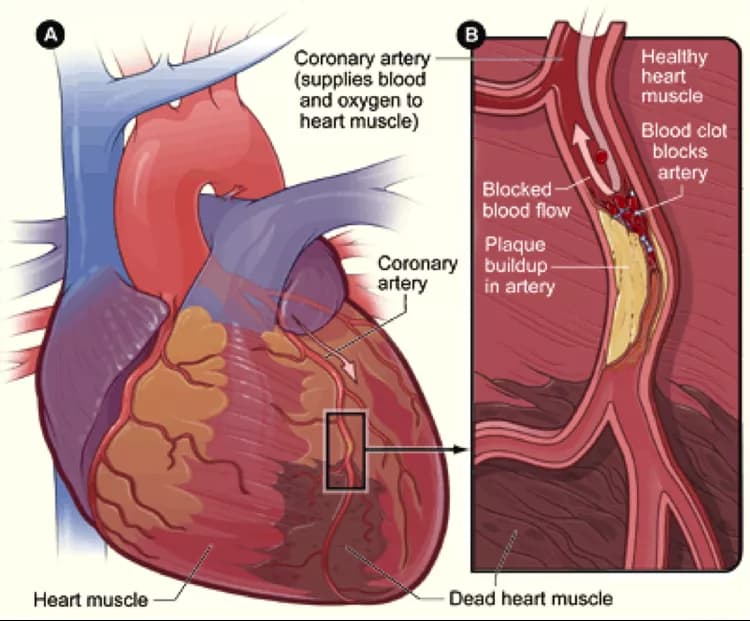
Higher Risk Of Dying Due To Heart Cell Damage Without Any Symptoms Occurs During Or After Non-heart Surgery
Surgery that doesn't involve the heart may cause damage to the heart in people with known or at high risk of developing heart disease and was associated with an increased risk of death, according to new research in the American Heart Association's journal Circulation.
Heart cell damage during or after non-heart surgery, known as perioperative myocardial injury (PMI), is an important yet often undetected complication following non-heart surgery and is strongly associated with death within 30 days after surgery, according to research published in the American Heart Association's journal Circulation. The causes of PMI are still under investigation.
"Patients with PMI are easily missed because they show no symptoms of heart disease in the majority of cases and only very rarely experience chest pain, which is the typical symptom of heart attack," said Christian Puelacher, M.D., Ph.D., first author of the study and a clinical researcher at Cardiovascular Research Institute Basel, in Basel, Switzerland.
To determine whether a patient's non-heart surgery damaged heart cells, researchers screened patients for PMI by measuring levels of troponin -- a heart protein -- in the blood before and after surgery to determine if there was injury to the heart. Troponin can indicate damage to the heart even when the patient has no symptoms. Non-heart surgeries ranged from low-risk (prostate or knee surgery) to moderate risk (hip replacement or gall bladder removal) to high risk (peripheral artery bypass or resection of a lung or the liver).
The researchers found that 1 out of 7 patients above the age of 65 or with preexisting coronary artery disease, peripheral artery disease, or stroke developed PMI. More than 90 percent of PMI patients reported typical chest pain. Patients with PMI had six times more likely to die of any cause within 30 days compared to patients without PMI. The high death rate associated with PMI persisted up to one year after surgery.
The increased death rate within the first 30 days of surgery highlights that PMI is associated with death early after surgery, Puelacher said. After one year, it was clear that the patients who had high levels of troponin, meaning there was some damage to the heart from non-heart surgery, were more likely to die, and that the main increase in deaths was observed within the first weeks after surgery.
"Recognizing PMI as a potential contributor to death after surgery might help improve the outcomes of non-cardiac surgery," Puelacher said. "However, since there are no clear treatment recommendations for these patients, treatment currently has to be tailored to each patient individually. Therefore, further research is needed to find optimal PMI management strategies following detection."
Patients were enrolled in the BASEL-PMI study, which is aimed at improving patient outcomes after non-cardiac surgery, focusing on heart complications in the period after surgery. From 2014 to 2015, 2,018 patients with known or at high risk of developing heart disease undergoing 2,546 non-cardiac surgeries at the University Hospital Basel in Switzerland, were included in the study.
Materials provided by American Heart Association. Note: Content may be edited for style and length.
Disclaimer: DoveMed is not responsible for the accuracy of the adapted version of news releases posted to DoveMed by contributing universities and institutions.
References:
- Christian Puelacher, Giovanna Lurati Buse, Daniela Seeberger, Lorraine Sazgary, Stella Marbot, Andreas Lampart, Jaqueline Espinola, Christoph Kindler, Angelika Hammerer, Esther Seeberger, Ivo Strebel, Karin Wildi, Raphael Twerenbold, Jeanne du Fay de Lavallaz, Luzius Steiner, Lorenz Gurke, Tobias Breidthardt, Katharina Rentsch, Andreas Buser, Danielle M. Gualandro, Stefan Osswald, Christian Mueller. (2017). Perioperative Myocardial Injury After Noncardiac Surgery: Incidence, Mortality, and Characterization. Circulation. DOI: 10.1161/CIRCULATIONAHA.117.030114
Related Articles
Test Your Knowledge
Asked by users
Related Centers
Related Specialties
Related Physicians
Related Procedures
Related Resources
Join DoveHubs
and connect with fellow professionals

0 Comments
Please log in to post a comment.